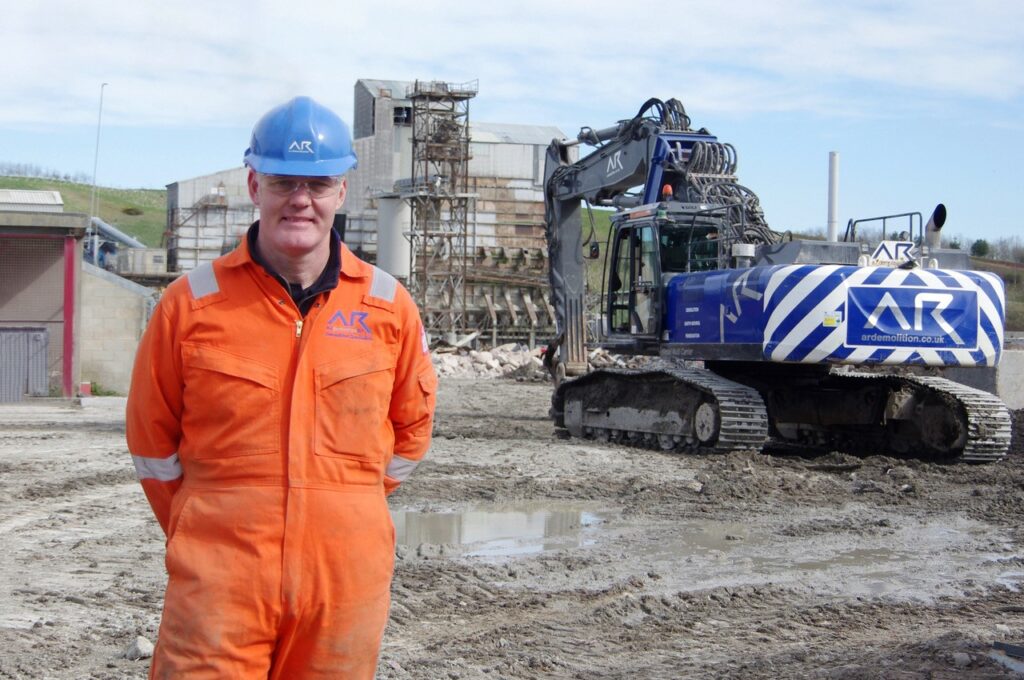AR DEMOLITION INNOVATES AGAIN… A UK FIRST FOR EXPLOSIVES AT CROFT QUARRY

Innovative demolition specialists AR Demolition have used cutting-edge explosive technology to bring down structures at a Leicestershire quarry, in a UK industry first.
Continuing its track record for pioneering new technologies, the company has used military-grade hypersonic “kick and cut” charges to bring down a large screen house at Croft Quarry.
Richard Dolman, CEO of AR Demolition, believes the project is the first time such charges have been used in the demolition industry, without the normal pre-weakening activity usually needed to bring a structure down.
Mr Dolman believes the techniques can now revolutionise safety in the industry while minimising danger to on-site personnel.
AR Demolition, which is based in Carlton near Market Bosworth, has been working at Croft Quarry since the start of the year after being contracted to complete decommissioning demolition by site owners Aggregate Industries.

The explosives work was part of a joint project to demolish the 1,200 tonne screen house as well as 150 metres of conveyor belts at the bottom of the quarry pit.
Designed by Wiltshire experts Alford Technologies, the kicking and cutting technique brings together two forms of explosive charge.
Mr Dolman said: “No one has used this technology in UK demolition before. It was a project which has taken considerable forethought and planning and we are delighted with the results.
“It’s a major stepping stone for us and, in my view, a huge moment for our industry. The fact that you can bring down buildings by severing steel without pre-weakening is a landmark moment.
“Alford Technologies have been working on these theories for a long time but, until now, there has been typical reticence in our industry to adopt new technologies.
“So I’m pleased to have been able to put the ideas into practice and find new ways of increasing safety in our sector.
“It was our first opportunity to test the technology and we have learned lessons along the way. We’re now looking forward to using the method on future projects.”
AR Demolition, based in Carlton near Market Bosworth, is making a name for itself as being one of the UK’s most forward-thinking and innovative demolition contractors.

The company has invested in cutting-edge Kiesel machinery, while its sister firm AR Aggregates has also invested in two pieces of kit from German manufacturer Kleeman, in a joint bid to improve efficiency, economy and safety performance. Mr Dolman has also pioneered the use of debris protection frames and dust suppression techniques.
The new relationship with Alford Technologies, based in Trowbridge, is the latest manifestation of AR Demolition’s mission to bring pioneering change to the sector.
Roland Alford, managing director and son of the company’s founder and chairman Dr Sidney Alford, said: “We are proud to have worked alongside such an innovative contractor to have brought this technology into practical, commercial usage. And we look forward to working with AR Demolition on future projects.
“We used our Dioplex charges to make a hypersonic blade which cuts through steel like butter, eliminating the need to burn and weaken steel beams.
“When combined with the Wallhammer kicking charge to remove the columns, the speed of these military grade munitions means they are relatively easy to control.
“Without the need to use human beings on weakening work, safety is greatly increased. If necessary, the charges can be placed by robots thereby removing the human element completely.
“The demolition industry now stands to benefit from the evolution of scientific improvements which, combined with the vision of a man such as Richard Dolman, mean that we can shape the future of the industry and improve safety for everyone involved.”

Back when I was a student in 2002 (or was it 2003 – my memory’s a bit hazy) , a meeting of around 150 students at the Leeds University Union passed a motion which meant The Sun newspaper would, based on its stance on the invasion of Iraq, no longer be available to buy on campus, for any of the 20,000 students who were based there.
Power to the people! Whoop, a victory for democracy! Hmm… just an incredibly unrepresentative one.
Twitter didn’t even exist then but I guess this was an early example of what in today’s parlance we’d call ‘cancel culture’. Yep, the strident opinions of a noisy, activist few affecting the consumer choices of a large, generally not-very-engaged majority. Sound familiar?
I don’t want to get into anything approaching the rights and wrongs of wokeness, trans activism, Black Lives Matter or anything like that. But as an industry professional I’m really interested in the dominance of social media in our news landscape.
A couple of weeks ago the BBC announced a commitment of £100 million of its TV budget to more creative diversity. To me, the Beeb seems pretty diverse already but still, I’ve got no fundamental problem with a broad church. Variety’s definitely the spice of life.
What upsets me more is that it came just a few days before the news that it was axing 450 jobs from its regional programmes, to save £25 million.
So let’s get that right. £100m out to increase diversity, £25m in… to do what, exactly? Only to more poorly represent the regional communities which help to pay the licence fee, surely?
All this at a time when regional newspaper companies like Reach Plc are set to cut 550 roles around the UK – seven from the newsdesk at my old paper the Bristol Post alone (how it will manage that, I have no idea) – and Newsquest is probably set to do something similar.
The irony that the BBC has reported this move by the newspaper groups (and itself, to be fair) as a ‘threat to democracy’ should be lost on no one.
Now, how does this all relate to Twitter? Well, I remember thinking when TV journalists started using their iPads to canvass public opinion, that it was at best a slightly lame attempt to be trendy and youthful and, at worst, really lazy journalism. The fact that “what people are saying on Twitter…” could become a story in its own right seemed then, and still does to me at least, really bizarre.
Part of the truth, however, is probably that with falling advertising revenues, the 24 hour news cycle and reduced staff numbers, all media are under pressure to produce huge volumes of content quickly and effectively. Social media becomes an easy way for them to do that. And if we don’t like it, we don’t read it or watch it and we choose to go elsewhere for our news.
However, in the case of Auntie – who is publicly funded, of course – well, she’s in our living rooms and on our radios whether we like it or not. And her desperation to appeal to the youthful audience results in her offering somewhat sinister primacy to ‘those who tweet’… at the expense of those who don’t.
The problem with this is that our national broadcaster paradoxically becomes increasingly less representative of the nation at large, not more. Even my dad has become pissed off with the BBC recently and he’s a proper stickler for tradition. Combine that with an existential requirement to compete against rival broadcasters for eyes and ears – common battle tactics of course being the age-old journalistic tactics of emotional hysteria and sensationalism – and mainstream media risks perpetuating divisions in our country at a time when we need unity and a common sense of purpose more than ever.
Anyway, anyway… what should this mean for your business? Well for starters, many of the business owners I speak to (mainly in a B2B context) recognise perfectly well that most of their customers, staff or supply chain – the audiences they need to be in touch with – don’t go near Twitter. Fact is, despite it’s apparent prominence it’s a channel used by a tiny minority of people – mainly the media, celebrities and those fixated on such matters. So if you’re a business-to-business company, there’s not much point in funnelling marketing resources into a medium which is not representative of your key audiences.
However, as many recently cancelled/no-platformed/career-ruined public figures (JK Rowling, David Starkey, Nigel Farage, even Rebecca Long-Bailey) can testify, put a foot wrong publicly and things can spiral rapidly out of control, even if you don’t think you’ll be affected.
So how to deal with it?
Well to be honest, much as I despise the concept of kowtowing to Twitter activists, if things go pear-shaped on social media you’re best off toeing the ‘approved’ line and waiting for things to blow over, rather than sticking up for what you may actually believe in (unfortunately, not all of us have the deep pockets that the creator of Hogwarts has at her disposal). Put out a statement, move on. Pick your battles.
Nope, Twitter’s not the medium to try and have a fight on. People talk a lot about hatred, intolerance and toxicity these days – sometimes it can seem that the most vocal supporters of ‘tolerance’ are the least open to having their views challenged. And as I’ve discussed, Twitter’s so unrepresentative of the population at large that, on balance, as a B2B organisation you’re best off ignoring it altogether. There are so many other media to tap into as ways to get your message across – traditional ones, LinkedIn, your sector publications.. all sorts, really, and all perfectly well-read, too.
If you’re nervous about dipping your toe into the shark-infested waters, hopefully that’s clarified the basis of what should be, in my mind at least, a sensible approach. And in the meantime, what I really object to – and what I’ll do my bit to influence, where I can – is the lack of accountability that the media seems to take in perpetuating these rifts between the newly-‘woke’ and those, like me, who always considered their eyes and minds to be open anyway. Do your work properly please, press people. There are millions out here who don’t use Twitter and we’re where the real action is happening, if you’d care to look for it.

How do I approach writing a blog on my thoughts on the media landscape this month? Do I keep things rational, reasoned and objective… boring, one might say… and lose readers and impact? Or do I say something controversial, maybe even provocative, and hope it bumps up my viewing figures for good or ill?
It’s a tricky one. Credibility or visibility? Well… both, hopefully.
That’s a debate which I suspect goes on regularly in the minds of our mainstream media executives, even if they won’t admit it. How does a news outlet tackle a contentious public issue? Should they deal with it in a calm, rational manner – stiff upper lip, and all that – or sensationalise things, hype things up a bit?
Of course people react more to controversy, and unfortunately the funding of all press outlets depend on viewing figures, readership numbers, audience sizes… so invariably it’s the latter approach which wins. And I think it’s a problem, especially at a time of crisis where the national interest and unity should be our number one priority.
This week I heard the genuinely astounding – and unanswered – words coming out of the mouth of an interviewee on one of our mainstream press channels. “It’s not about facts and figures,” they said. “It’s about feelings.”
It’s worth pausing and reflecting on this. Is the voice of reason in national debate now redundant?
It seems to me that, as the media landscape changes and as the internet throws up new press channels which, lumped together, constitute an enormous threat to the established status quo, the ensuing scrabble for audience share has heightened the focus on hyperbole, passion… even tears, if the journalist can get them. “You got them to cry! Let’s splash it… ker-ching!”
But going back to one of my previous posts – regarding my journey from doubt-riddled miserabilist to confident owner of a successful PR agency – the defining feature of my personal enlightenment (pinch of salt here, please), has been the ability to master my emotions, to recognise that they’re mine alone, to understand that the solution comes from within. That’s an age-old philosophy and one which I’ve only recently come to terms with.
My experience has taught me that it’s fine to express your passions but, in reality, it’s probably true to say that not that many people really care about your emotions. People certainly won’t look to do business with them. It’s what you do that counts.
And besides, our emotions are all so disparate and unique, how do we achieve anything by trying to build a consensus around them? Surely uniting around a coherent, rational, sensible set of values is the way to progress towards something better. The alternative is that we all just spin around like badly let off fireworks.. it’s mayhem.
So by that rationale does the short-termist obsession with views, listeners, clicks and shares, really matter more than helping propagate a world where rational argument, sensible thought and objectivity presides? Has reason lost its value? I don’t think so.
My cousin Nick, a pioneer in holistic physiotherapy based at his start-up business The Good Physio in Exeter, is an expert on the link between psychological and physical pain, the understanding that mental stress and chronic pain are inextricably linked, that if you can manage your mental processes it will have an impact on your physical health. And vice versa, too. Anyone who has ever felt stress literally draining out of their mind as they start running round their local park after a horrible day’s work, will understand exactly what he means. Clarity, calm… that’s where the good things happen.
Isn’t that important? That a potential resolution for your issues are either: have a rant, be angry, blame someone else… short-term gain but probably long-term pain; or, take a walk, step back from your issues and find a lasting solution in the process. It’s a no brainer, surely.
I’m talking figuratively, as well as literally here. Because this stuff applies to our media, too.
Wouldn’t a bit of calm, some feel-good positivity be nice in the news occasionally? Surely that’s the way for us to achieve unity of purpose and direction on a range of issues – social, economic, political – through reasoned discussion about the topics in question to find a sensible way forward?
Unfortunately the media tend to cause more problems than they solve in this regard. It’s all so negative, combative, point-scoring. They’d argue that it’s their job to do so provoke debate, but I think they also have different, wider responsibilities. What’s becoming more apparent to me daily – maybe I’m getting old, or maybe I was naive before – is that each outlet’s number one interest is its own survival and that the news agenda is made to fit. That’s just about acceptable for a commercial organisation but for publicly-funded outlets in particular, it’s not good enough.
A few months ago there arose an interesting episode with a client of ours. On behalf of AR Demolition – an innovative contractor based in the East Midlands – we put out a press release offering an alternative to the practice of using scaffolding on some demolition jobs, following a worrying spate of collapses. Richard Dolman, the MD of the company, proposed a better solution, using new inventions to improve safety and reduce risk.
It caused no end of a rumpus. Demolition contractors with side companies in scaffolding were (unsurprisingly) up in arms, the industry body distanced itself from the comments, powerful voices came out in criticism.
But Richard was right, of course. Innovation and technology are the key to improved safety in the construction sector. And on alongside the self-interested critics of Richard’s views was a chorus of support – notably from sector press editors, to be fair – people saying ‘thank you’, ‘about time’, that sort of thing.
The point is that the highly vocal minority here were not actually the ones who we were targeting. Just because they shouted the loudest – outrage driven in reality by self-defensive emotion, one suspects – it didn’t make the message invalid, or negate the benefit of the press coverage (multiple pieces, by the way, in true Turn the Tables style…).
And of course, for a disruptive contractor looking to turn the tables in his industry, who really cares what the rest of competition think? It was building companies, construction firms, local authorities… the type of people issuing tenders, not the ones competing for them, whose opinions really counted. And they’ll certainly have recognised the benefits of working with a contractor which espouses progressive, sensible values.
This is worth remembering, for anyone looking at PR as a marketing tool. The noise – and there’s a lot of it – often isn’t where the real business action is. Decisions which are crucial to the success of your business are made far away from the superficial confines of social media. Pick your battles wisely, of course – there’s no sense in blundering into conflict in a tedious echo chamber where you have no chance of victory (I like the analogy of Neo being overwhelmed and smothered by Agent Smith clones in the Matrix Reloaded. “More…”).
But also recognise that, just because you might not see instant evidence of it, you can always trust that your message is getting through to those with whom it counts. Dominic Raab will no doubt take a media pasting for comparing the BLM genuflection to a Game of Thrones trope, but all that matters to his party is that a large and significant swathe of his electorate will applaud his stance. The reason that they say ‘there’s no such thing as bad publicity’ is because, assuming you’re not saying something unutterably unreasonable (and why would you?), your message will register with the decision-makers who matter. Meanwhile the serial objectors, who you’re never going to win over, simply make a noise… and move on.
And quietly, but confidently, your business will get where it wants to be.
by Rupert Janisch

By now you’ll have dealt with initial shock of being forced to close business, or dramatically adapted your offering or modus operandi. Have you communicated this effectively and are you making the most of the efforts you’ve made?
Are your staff aware of the steps you’re putting in place to keep the business ticking over? And how are they coping? Your employees’ well-being in these unsettling and uncertain times is your responsibility. Make sure they are safe at home, that their workstation is optimal, the IT set up supports productivity and that you are making the most of collaborative tools and communication channels.
Have you targeted new potential customers – for example by putting a social media strategy in place, or by getting online press publicity? There’s never been a better time to target the digital audience – alongside the tasks we’re all having to juggle at home, we’re digesting content like never before. However, it’s important to get the tone right, to not look like you’re cashing in on a crisis.
It’s a rapidly-evolving situation, too. So don’t rest on your laurels. Employees will be looking for guidance from their leaders. Customers bases will develop as restrictions are eased and the economy adapts. Plan ahead, get ahead of the game so you can react faster than your competitors.
And you should be proudly publicising any efforts you’re making to help your community through this extraordinarily challenging time. People will remember those companies who went the extra mile to support the national effort.
Now is also a really good time to audit your marketing activities. Are you happy with your website, your tenders, social media platforms, PR strategy, newsletters, advertising? They should all be playing together like an orchestra, in harmony. If they’re not, then this is the ideal time to straighten things out.
Yourcomms shouldn’t stop once we’re over the crisis. Take people with you through the recovery – your employees and stakeholders will want an optimistic yet realistic outlook how your business can grow and prosper in the future.
A report by business consultants McKinsey recently highlighted five stages – horizons, they called them – in the journey through this crisis. They were:
These sound like big corporate themes but they’re actually applicable to all businesses, large and small. And at every stage in this journey, PR and comms could help to bring people – customers, clients, suppliers, employees, stakeholders – with you throughout the weeks, months and years ahead.
Turn The Tables is itself a reimagining – a broadened offering based on the PR background of its predecessor Elmhay PR and Media. Its founder Rupert Janisch has developed a his own reputation and a solid client base over the last decade, while always toying with the idea of developing a ‘virtual agency’ – a network of quality freelancers all working remotely, offering great services without the agency overheads (offices, recruitment costs, holiday pay and so on) normally passed on to clients.
So whatever your message, whatever channel you need to promote it through, we’re here to help. We have a host of experts at your disposal – writers, ex-journalists, comms professionals, marketeers, designers, photographers and videographers, social media gurus – all independent and working at reasonable rates.
Of course we’re happy to have an initial chat, no obligations and free of charge. Fundamentally, we’re at your service. So drop us a line if you need some support.

We’re all in the thick of the coronavirus crisis. No one’s exempt. The situation’s a massive challenge for businesses, their employees and our communities. So it’s an important time to communicate properly while you weather the storm and plan for the future.
So how can PR and communications help your business during this? Well, we’d suggest it’s vitally important to think carefully about each different audience you need to be speaking to, so they know how your business is coping, adapting and planning for the future.

We’re all in the thick of the coronavirus crisis. No one’s exempt. The situation’s a massive challenge for businesses, their employees and our communities. So it’s an important time to communicate properly while you weather the storm and plan for the future.
So how can PR and communications help your business during this? Well, we’d suggest it’s vitally important to think carefully about each different audience you need to be speaking to, so they know how your business is coping, adapting and planning for the future. These may be obvious immediate audiences necessary to communicate with for short-term survival. Or they may be new audiences, as yet untapped, who can be the key to future success.
The organisations which survive – and even thrive – will be those which adapt to circumstances, take quick, decisive and sound decisions, communicate them properly and take their staff, suppliers and customers with them on this journey.
Ideally, you should be looking to:
So whether it’s through press releases, social media activity, newsletters, staff communications or lobbying – PR and communications experts can help devise and execute the most effective ways to get your message across.
The coming weeks and months are effectively a period of ongoing and continuous crisis, so getting your messaging right as the situation evolves could be critical to your future.
Simply, PR is reputation management. It’s looking after how your company is perceived. Of course there are a range of audiences this can be applied to – your shareholders, your staff, customers and clients, graduates, the community and the general public, investors – and there are different tactics and strategies for each.
One of the best ways to get your message out is through the media and that’s what PR experts usually specialise in. The best are often ex-journalists, working with colleagues in the press to tell business stories and promote a client editorially, without paying for advertising.
Editorial coverage packs the most punch – people read, discuss and share it on social media and sometimes even send it viral. But it takes skill to get right, often some lateral thinking, and confident honesty with a client over what will (and won’t) pique a journalist’s interest.
PR also covers crisis communications – helping to protect a brand during times of crisis and also dealing with any negative media attention as and when it occurs.
We’re not talking about your IT set-up here – ‘comms’ are the other ways, apart from through the media, of how you communicate with your key audiences.
There’s a massive variety here and the key is to select the right tactic for the right audience. It could range from local newspaper advertising, leaflets and inserts, SEO or online spend, video footage, through to press releases distributed by newswire, or quality printed collateral delivered by post. Getting the medium is as important as the message.
So for example, a blue chip firm wouldn’t release its company annual report to investors through a series of posts on Twitter. Nor would a local pizza chain promote a Wednesday night two-for-one offer in a press release to its key business sector publication. It’s a matter of identifying the appropriate audience for what you want to achieve, then strategising your comms and executing as appropriate.
Your employees are of course key internal stakeholders. It’s essential to keep them motivated and productive, looked after and well-informed so that they stay with you, work hard and help to advocate your brand. How are you communicating with them? And are you making the most of the potential that your relationship with them can have?

By now you’ll have dealt with initial shock of being forced to close business, or dramatically adapted your offering or modus operandi. Have you communicated this effectively and are you making the most of the efforts you’ve made?